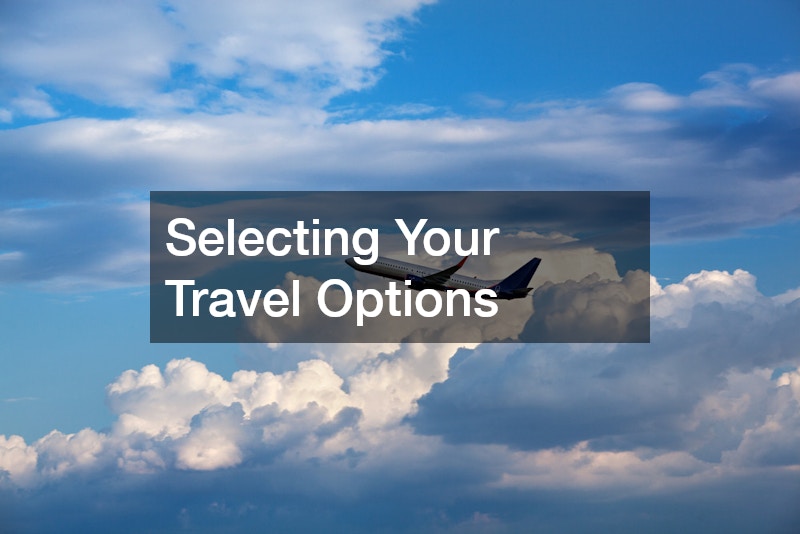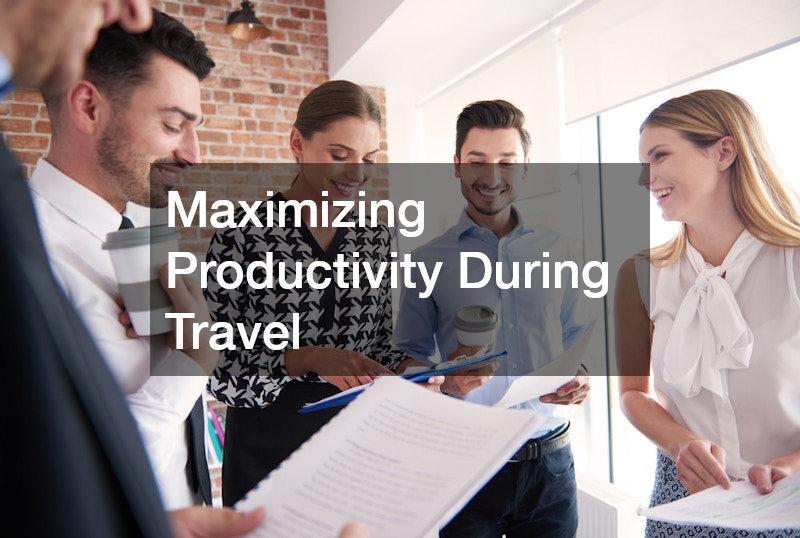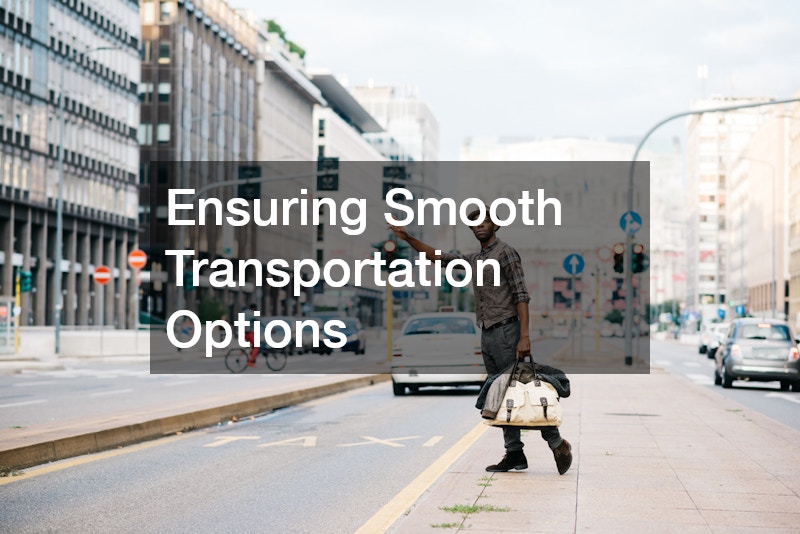Planning a business trip requires careful consideration of several key elements. By making the best choices for travel, food, accommodations, and excursions, you can ensure that your trip is productive and enjoyable. This guide will provide you with detailed insights into each component of planning a successful business trip.

Selecting Your Travel Options
Choosing the right travel option is the first step in organizing a successful business trip. Consider booking flights well in advance to ensure you get the best rates and convenient travel times. Arriving at the airport with ample time before your flight ensures a smooth start to your journey.
Explore various modes of transportation to the airport, such as public transit, taxi services, or airport shuttles. Each has its own advantages, such as cost savings or convenience. Evaluate these options based on the specific needs and expectations of your business travel.
Once at your destination, look into renting a car or using ride-sharing services to navigate the area efficiently. Each choice should align with the objective of your business trip, whether it involves visiting executive offices or attending a strategic growth partnership meeting. Balancing cost, convenience, and flexibility is crucial in final decisions about local transport.
Finding the Right Accommodations
Selecting appropriate accommodations plays a significant role in planning a business trip. Consider proximity to business venues, local attractions, and dining options. A hotel with a good hotel phone system also ensures efficient business communications during your stay.
Research accommodations that offer essential business amenities, such as Wi-Fi, meeting rooms, and quiet workspaces. These facilities can greatly enhance productivity and allow for seamless conduct of business activities. Properties that provide flexible booking and cancellation policies are also beneficial in case of sudden plan changes.
Prioritize hotels that offer catering services for business meetings or executive offices within or near the property. Enhanced services like an in-room hotel phone system can be advantageous if you need to conduct business from your room. Evaluating these factors will help make an informed decision, crucial for ensuring a smooth and productive trip.
Packing Essentials for Business Travel
Packing efficiently is essential when planning a business trip. Consider the climate of your destination, the expected business attire, and any equipment you’ll need to take with you. Business travelers often prioritize versatile clothing that can easily transition from professional settings to casual environments.
In addition to clothing, include essential gadgets such as laptops, tablets, and mobile devices. Chargers, adapters, and portable batteries are also must-have items to ensure connection throughout your trip. Organizational tools like business cards and notebooks can facilitate important networking opportunities.
Don’t forget to pack personal care items and basic medical supplies. Familiarity with your travel itinerary will help you pack only the necessary items, avoiding both over-packing and forgetting crucial items. Strategic packing enhances the overall experience and efficiency during your business travel.

Exploring Local Cuisine
Sampling local cuisine serves as a delightful break from business duties. For those interested in a diverse menu, many recommend trying a pasta restaurant renowned for authentic regional dishes. Such experiences provide not just sustenance but also cultural enrichment, making business trips more enjoyable.
If you’re seeking a more hearty meal, consider dining at a steak restaurant offering local cuts and flavors. Incorporating these exquisite dining experiences into your trip can make long days of meetings much more rewarding. Exploring different culinary options not only enriches your trip but also supports local business growth.
Visiting a hibachi restaurant can present a unique dining experience while permitting relaxed social interaction. These venues often offer group-oriented seating appropriate for both informal business discussions and leisure dining with colleagues. Choosing diverse dining locations also enhances the overall travel experience, memorable long after your trip concludes.
Choosing Excursions to Enhance Your Trip
Excursions provide valuable downtime, allowing you to experience local attractions and culture. Including visits to nearby attractions, such as a local zoo, can be both relaxing and invigorating. Such breaks are vital for rejuvenation and can even inspire fresh perspectives and new ideas.
Exploring local attractions enables deeper cultural immersion, making your trip more rewarding. Planning excursions around your official schedule ensures that these activities do not compromise productivity but rather enrich your overall experience. It’s an excellent opportunity to network with local professionals, enriching your strategic growth partnership opportunities.
You might consider tours that emphasize regional culture, history, or natural beauty, supporting local tourism and local business growth. Seeking excursions that align with your interests and schedule can maximize your enjoyment and satisfaction. These experiences contribute to a balanced mix of work and leisure, often resulting in a more effective business trip.
Planning for Downtime Activities
Balancing work with leisure is essential when planning a business trip. Planning for downtime activities ensures you return refreshed and focused. Consider pursuing hobbies, such as visiting local parks or sampling unique cultural venues, which can enhance your understanding of the area.
Activities like attending local events or visiting art galleries can provide pleasant distractions from the rigorous business schedule. These moments can foster creative thinking, contributing positively to business growth. Taking time to unwind is crucial for maintaining productivity and mental well-being.
Consider setting aside time for exercise, whether it’s a simple walk around town or using the hotel gym. Combining minor leisure activities with your work schedule can break monotonous business routines. Ensuring downtime not only aids personal wellness but can re-energize and prepare you for upcoming business tasks.

Maximizing Productivity During Travel
Travel time doesn’t have to be unproductive. Utilize travel intervals by organizing your schedule, preparing for meetings, or catching up on industry insights related to your business’ growth. This proactive approach can make transitions between locations more efficient.
Technological tools like smartphones and laptops can provide essential connectivity during travel. Leveraging applications for note-taking, scheduling, and communications keeps you organized while also supporting strategic growth partnership objectives. Planning these applications into your travel itinerary ensures continued productivity.
If traveling with colleagues, use this time for brainstorming sessions or informal meetings. Such interactions can enhance team cohesion and inspire innovative solutions. Travel time, when planned efficiently, can result in productive sessions that significantly contribute towards your business objectives.
Budgeting for Your Business Trip
Planning a business trip begins with a comprehensive budgeting plan. Determine your primary expenses, including airfare, accommodations, and dining at specific venues like a pasta restaurant. Establishing a clear budget helps control expenses and allows for support towards business growth objectives.
Identify areas where cost savings can be made, such as travel deals or shared accommodations. Opting for cost-effective dining options, like a hibachi restaurant, can ensure a balanced budget without sacrificing quality. Proper budgeting can also allow for allocation towards excursions and other beneficial downtime activities.
Track and analyze expenses throughout the trip to stay within your financial plan. Developing a method for recording expenditures will help ensure everything is accounted for, supporting overall trip efficiency. This practice not only aids in financial control but also in evaluating trip success in terms of both business and leisure outcomes.
Creating an Itinerary for Efficiency
An efficient itinerary is the backbone of a successful business trip. Schedule work-related activities, such as meetings at executive offices, in advance. Utilize this itinerary to allocate time not just for work but also for local dining experiences and leisure activities.
Include time blocks for unexpected meetings, travel delays, or spontaneous exploration of local attractions, such as a local zoo. Flexibility within your schedule is crucial for utilizing opportunities as they arise. Organizing your itinerary effectively ensures balanced time management, contributing to the success of your trip.
Optimize your itinerary by strategizing locations and travel times to minimize transit. This approach not only saves time but also reduces stress related to navigating unfamiliar areas. A well-devised itinerary enables a streamlined experience, supporting effectively the overarching goals of the business trip.

Ensuring Smooth Transportation Options
Planning a business trip includes determining the best transportation options. Start by researching the most efficient ways to travel between the airport, your accommodations, meeting locations, and other destinations. Services like airport shuttles, rideshares, or private car hires can provide reliable options. If renting a car, confirm the availability of vehicles in advance and review parking options at your hotel and venues.
Public transportation may be an economical and convenient choice in cities with robust transit systems. Familiarize yourself with routes and schedules ahead of time, and consider downloading apps to streamline navigation. Timing is essential—schedule transportation with enough buffer time for delays. Peak traffic hours can impact travel, so plan accordingly, especially in busy metropolitan areas.
For longer trips, consider booking train or bus tickets in advance to secure the best seats and rates. If your trip involves multiple stops, map out your itinerary to minimize unnecessary backtracking. Lastly, always have a backup plan. Save contact numbers for local taxi services or alternative routes in case of unexpected issues. By prioritizing transportation logistics, you’ll reduce stress and arrive at your meetings on time, ready to focus on the business at hand.
Utilizing Travel Rewards and Benefits
Maximizing travel rewards and benefits can significantly enhance your business trip experience. Many credit cards and travel loyalty programs offer perks such as upgrades, access to executive lounges, and discounts at agencies. Leveraging these benefits can result in considerable savings and a more comfortable journey as you’re planning a business trip.
Compare reward programs before committing to one, evaluating features like point accumulation and redemption options. Participating in a program that aligns with your travel preferences and frequency can substantially impact the quality of future trips. Integrating travel rewards into your budgeting strategy can ensure both convenience and financial benefits.
Staying informed about the latest promotions or offers can provide additional advantages. Aligning your choice of travel and accommodation with eligible reward-earning opportunities will enrich your travel experience. These travel benefits not only support individual trips but also contribute to overarching personal and business growth strategies.
Booking Office Space
Sometimes planning a business trip necessitates the booking of office space at your destination. Finding appropriate executive offices equipped with essential services and technology is fundamental when organizing face-to-face meetings. Ensuring these spaces offer necessary amenities can directly contribute to meeting success.
Consider spaces that offer additional services, such as sushi catering, to streamline all aspects of meetings or events. Making arrangements that allow for seamless business operations will save time and reduce stress. Finding the ideal venue involves aligning the space’s features with your particular business requirements.
Many modern executive offices provide flexible booking terms, essential for accommodating dynamic schedules. Recognizing and prioritizing such options aids in efficiently addressing any last-minute changes. Thorough research into available office spaces will enhance both productivity and the professionalism of your trip’s engagements.

Utilizing Networking Opportunities During Your Trip
Planning a business trip is an excellent opportunity to expand your professional network. While your primary focus may be meetings or conferences, proactively seeking networking opportunities can yield valuable connections. Start by researching events such as industry meetups, seminars, or workshops happening during your trip. Attending these gatherings can introduce you to like-minded professionals and potential collaborators.
If you’re visiting a conference, explore its schedule for networking sessions or social events. Many organizers host mixers or breakout sessions specifically designed to encourage interaction. Don’t hesitate to engage in conversations—introduce yourself confidently, exchange contact information, and discuss shared interests or business goals. During your downtime, consider casual networking opportunities. Hotel lounges, coffee shops, and local coworking spaces often attract professionals. Strike up a conversation with others in these settings to exchange ideas and experiences.
Social media is another powerful tool. Use platforms like LinkedIn to connect with individuals in your destination city before arriving. Send polite messages expressing your interest in meeting for coffee or discussing mutual interests. Finally, be prepared. Carry business cards and an updated digital portfolio if relevant. Following up with new contacts after your trip shows professionalism and solidifies the connections you’ve made, ensuring your networking efforts are productive.
Planning a business trip involves informed decision-making regarding travel, dining, accommodations, and leisure activities. This comprehensive strategy enables travelers to achieve key business objectives while enhancing personal satisfaction. Thoughtful preparation and execution of these plans can lead to significant business growth and enrich every aspect of the business travel experience.



